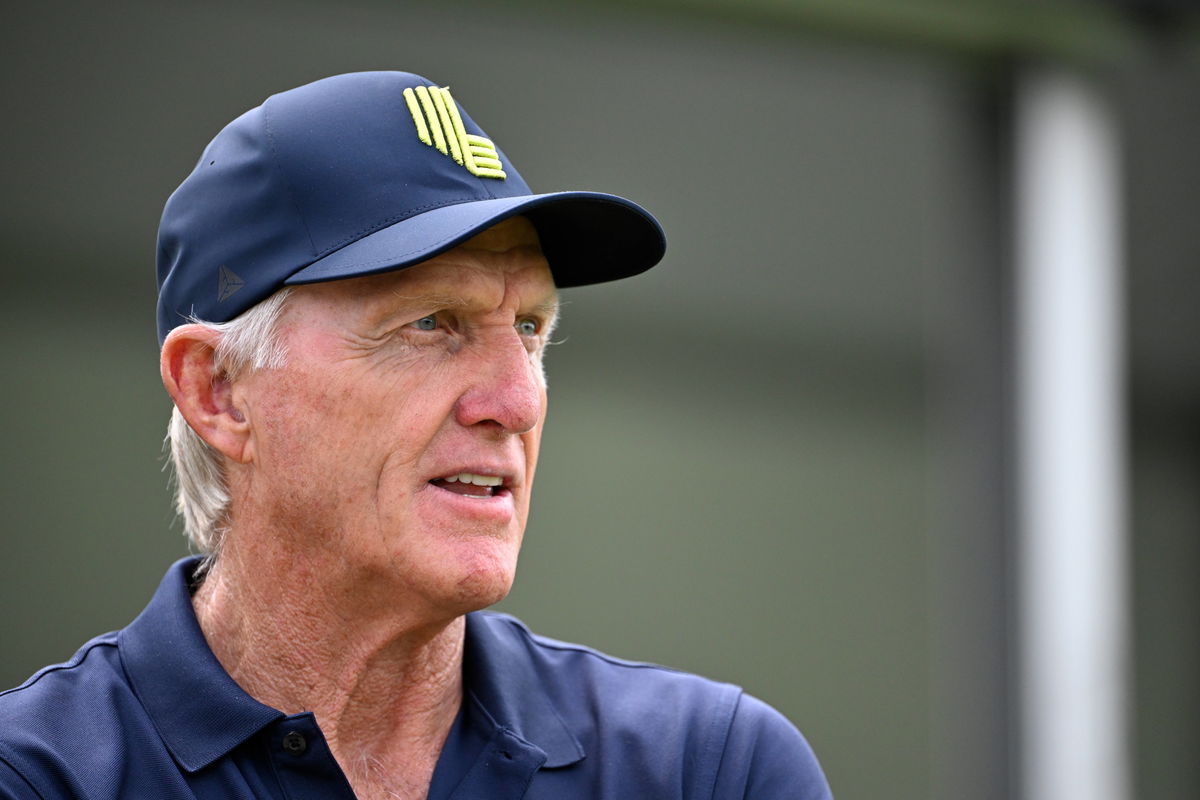
Imago
Golf: LIV Golf Greenbrier Aug 16, 2024 Greenbrier, West Virginia, USA LIV Golf CEO Greg Norman at The Old White at the Greenbrier. Greenbrier The Old White at the Greenbrier West Virginia USA, EDITORIAL USE ONLY PUBLICATIONxINxGERxSUIxAUTxONLY Copyright: xBobxDonnanx 20240816_bsd_sd2_023

Imago
Golf: LIV Golf Greenbrier Aug 16, 2024 Greenbrier, West Virginia, USA LIV Golf CEO Greg Norman at The Old White at the Greenbrier. Greenbrier The Old White at the Greenbrier West Virginia USA, EDITORIAL USE ONLY PUBLICATIONxINxGERxSUIxAUTxONLY Copyright: xBobxDonnanx 20240816_bsd_sd2_023
Ian Baker Finch could never have guessed that in less than a year after winning The Open Championship, his life would take a detour. His triumph at the Royal Birkdale in 1991 brought him the success he’d longed for, propelling his name into the top 10 of the OWGR. But golf, as he would learn, had other plans.
Watch What’s Trending Now!
“I played 15 tournaments in ’95 on the PGA Tour. I missed the cut in all 15. No matter what I did, I tried to get myself fit and strong. I was doing everything I could,” Baker Finch shared in a recent episode of The Smylie Show Podcast. After his Open win, Baker-Finch felt the need to add distance off the tee to compete with longer hitters like Greg Norman and Nick Faldo. In chasing that extra yardage, he ended up incorporating too many changes and working with multiple coaches, eventually leading to the “loss of his own swing.“
“I’d lost what I had in 1991 by that time.” It was then that Butch Harmon—one of the era’s most sought-after teachers—offered to help. “He kept telling me in ’96, ‘Come see me anytime. I’ll look after you.’ And he’s the only one I didn’t go to. He was working with Greg, so I didn’t feel comfortable.“
OUT NOW! 👇
Ian Baker-Finch: Reflections on a Remarkable Golf & Broadcasting Career
Link: https://t.co/oespfTcrsA pic.twitter.com/mMZ7m4bJxl
— The Smylie Show (@thesmylieshow) August 13, 2025
Norman and Baker-Finch were contemporaries, and it’s likely Finch felt approaching Harmon would be inappropriate while he was already dedicated to another leading player. Both men hailed from Queensland, Australia, and turned pro around the same time. Norman was “The Great White Shark”, famed for his fearless aggression, while Baker-Finch earned the nickname “The Dark Shark, for his finesse-driven game — a respectful nod to Norman’s Moniker. The hesitation to take Harmon’s help carried extra weight, as in 1995, Greg Norman was at his peak — he had won the Memorial Tournament, became the PGA Tour’s all-time leading money winner, and reclaimed his No. 1 spot in the OWGR.
Meanwhile, Baker-Finch’s slump never lifted. By 1996, he had missed his first 11 cuts of the season, and the frustration reached a breaking point when he withdrew midweek from The Open at Royal Lytham. He went home to Australia, took six months off to rehab injuries. and began rethinking his future.
“I started doing the television in Australia that year, that summer. And I did 12 events in a row. And that basically was the sliding door moment when I was offered a job over on the PGA tour with Jack Graham and ABC after that,” Baker Finch told Smylie Kaufman. What started as a reluctant retreat from competition became the launchpad for a second career. He built his skills in Australia before moving into a US broadcast role, eventually becoming one of the most respected voices in golf coverage. In 2007, he joined CBS, but after a successful run of 19 years, he finally parted ways with them.
But even after all these years, Baker-Finch and Norman’s relationship is still layered. Although they have never expressed any open animosity towards each other, Baker-Finch, at times, has supported players like Rory McIlroy in criticizing Norman’s leadership at LIV Golf. A step he thinks could hinder unity in professional golf.
Coming back to Baker-Finch, it wasn’t just hesitation to take guidance from Greg Norman’s coach, but also his own mental health battle, which ended his career in pro golf.
The mental battle that ended Ian Baker-Finch’s career
Baker-Finch has never shied away from admitting that what derailed him wasn’t just physical. It was also in his head. The constant tweaking of his swing chipped away at his natural instincts until the simple act of hitting a golf ball became a minefield of overthinking. He’s compared it to the yips, a term golfers use for an almost inexplicable block in performance, where muscle memory and confidence vanish under pressure.
“It’s that anxiety level that changes our ability to do what we do so well when we’re brain dead and we’re just going, you know, we’re just so focused. And I lost that ability to compete,” he shared in The Smylie Show podcast. Without the ‘brain-dead’ focus, elite players rely on — when you stop thinking and just play — every shot becomes a test.
Once that mental fog set in, tournament golf became an uphill battle he couldn’t win. The grind eventually pushed him away from competition altogether, leaving him to rebuild his relationship with the game from the outside looking in.


